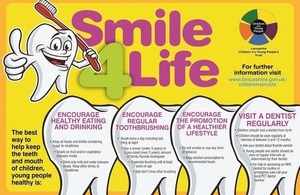Smile4Life in north west England
The Smile4Life programme aims to reduce tooth decay in children, laying a solid foundation for their good oral health throughout life.

Smile4Life poster
Summary
Children in Lancashire and Cumbria have poorer dental health compared to children in other parts of England. The Smile4Life programme was developed in partnership with local authorities to address this problem.
The programme aims to reduce tooth decay in children, laying a solid foundation for their good oral health throughout life.
The approach focuses on sustained behaviour change, supported across the health and social care systems, involving everyone who has a role in the development of children and young people (CYP). The interventions are informed by Delivering Better Oral Health: an evidence based toolkit for prevention.
4 major areas for action provide the framework for implementing the programme. These encourage:
- healthy eating and drinking
- regular tooth brushing
- promoting of a healthy lifestyle
- visiting a dentist regularly
Experienced NHS oral health improvement practitioners (OHIPs) and dental nurses train nominated oral health champions in the CYP workforce using a standardised training package and web-based resources. These oral health champions then share and embed evidence-based oral and general health practices within their workplaces.
What was involved
Oral health was identified as a Local Indicator in the Local Area Agreement and in Lancashire’s Children and Young People’s Plan in 2009 to 2012, recognising the important role that good oral health has in children’s development.
It was agreed that oral health improvement could and should be undertaken by the CYP workforce in the settings frequently used by children and their families. Smile4Life was developed to address this.
An award scheme ensures that these settings understand their responsibility in providing and implementing a supportive environment for the improvement of the oral and general health of the children and young people in their care, rather than just providing information and relying on personal or parental behaviour changes. The awards are based on the programme’s 4 major areas.
Support is provided by OHIPs and dental nurses, using a standardised training pack and e-learning tool.
In addition, Smile4Life toothpaste and brush packs are given out as part of the Healthy Child Programme and contain a Smile4Life leaflet. Local health visitors all receive Smile4Life training to ensure only evidence informed advice is given.
In Cumbria, dental practices close to the early years settings are commissioned to support the delivery of Smile4Life using trained dental nurses. These dental nurses are then conduits to dental care and evidence-based preventive practice such as fluoride varnish and fissure sealant application.
In Barrow in Furness the Smile4Life tooth brushing scheme is being implemented in 6 primary schools. School based tooth brushing assistants have all received Smile4Life training, with particular focus on tooth brushing and cross infection prevention and control. The assistants also establish whether the children are registered with a dentist and are attending regularly. If not, they are supported to attend a nearby dental practice and follow up monitoring is undertaken.
What works well
The branding has been used consistently across all products and has enabled delivery of important oral health messages across organisational boundaries and by a wider workforce. A PhD study found that the branding had become familiar across Lancashire and was now synonymous with oral health and dental care.
More than 70 dental nurses have been trained in the delivery of evidence-based preventive messages and application of fluoride varnish in dental practices. This serves to enhance dental practices’ preventive culture.
Embedding the programme as a mandatory activity within Children’s Centre specifications was central to the success of Smile4Life. Local authorities are therefore now being encouraged to embed Smile4Life within their Healthy Child Programme specifications to ensure only evidence-based oral health improvement activity is undertaken by the wider workforce.
Next steps
Although the focus to date has been on early years, work has been undertaken to develop a programme for vulnerable adults.
Further information
For further information regarding Smile4Life, the award scheme or its products and resources, contact a member of the team:
Melanie Smith, Health Care Public Health Project Support Manager (Dental) melanie.smith@phe.gov.uk
Melanie Catleugh, Consultant in Dental Public Health melanie.catleugh@phe.gov.uk
Eric Rooney, Consultant in Dental Public Health eric.rooney@phe.gov.uk